Oriental style in the interior
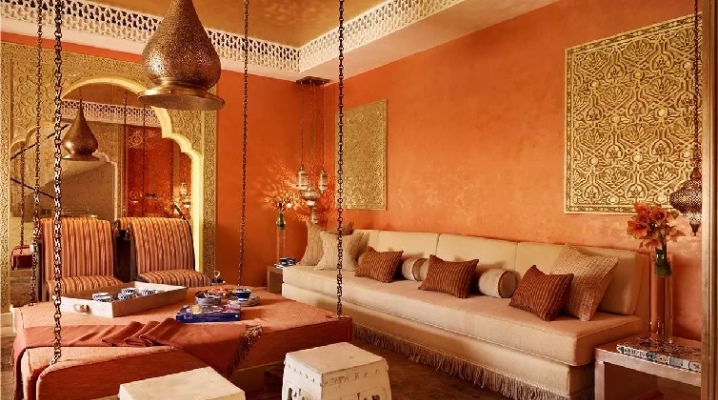
In recent years, one of the most popular styles in interior decoration is oriental. It is characterized by the brightness of colors and originality, therefore it attracts the attention of citizens. This direction is preferred by those who are already tired of minimalism and want to surround themselves with real luxury and amazing objects. In addition, the oriental style will be an excellent solution for high-status people who want to emphasize their knowledge of culture.
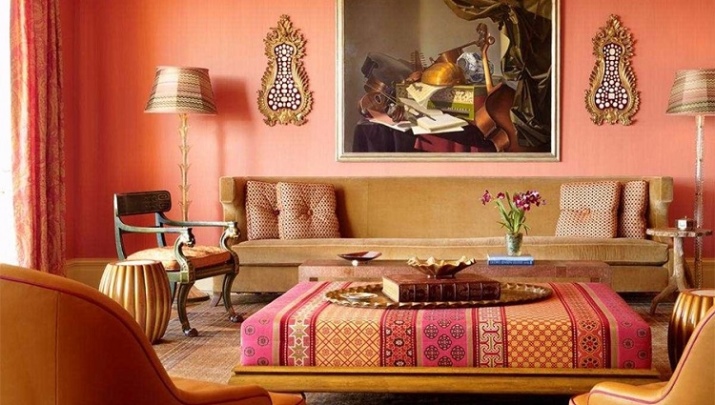
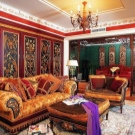
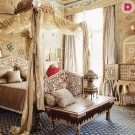
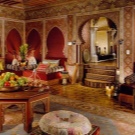
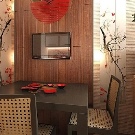
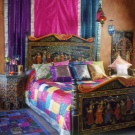
Main features
The oriental style is considered one of the most relevant in the design of large houses and apartments. Several distinctive features of this direction should be highlighted.
- Large rooms are usually divided into zones using sliding screens, drapes and curtains. It is worth noting that each direction of the oriental style has its own specifics. For example, Arabic allows you to use false curls, thanks to which you can change the shape of the room, while the Japanese version involves the use of partitions.
- This style is characterized by its own vision of the geometry of the room. This tradition has been in demand since the Middle Ages, when it will be necessary to provide for a huge number of secret passages and tunnels. Thus, rich people tried to protect themselves as much as possible from various troubles.
- Simple and laconic forms are used as furniture, and there is also a parsimony of arrangement. There should be as little furniture as possible, but close attention is paid to accessories. It is thanks to them that the room is filled. The number of details is influenced by the fact which direction of the oriental style is used. For example, an interior designed in the Chinese version assumes the presence of a minimum of decorative elements, but in Moroccan there are a huge number of them. For Egyptian interiors, warm colors and lots of free space are usually used.
- In every room in oriental style, regardless of the characteristics of the direction, exclusively natural ingredients are used. For flooring, wood or stone is ideal. The latter option is more preferable, as it allows you to lay a beautiful mosaic or any other type of tile.
- The ceilings are made in a white color scheme or in the same shade in which the walls are finished. An exception is the Asian direction, where wooden beams are used as a decorative element.
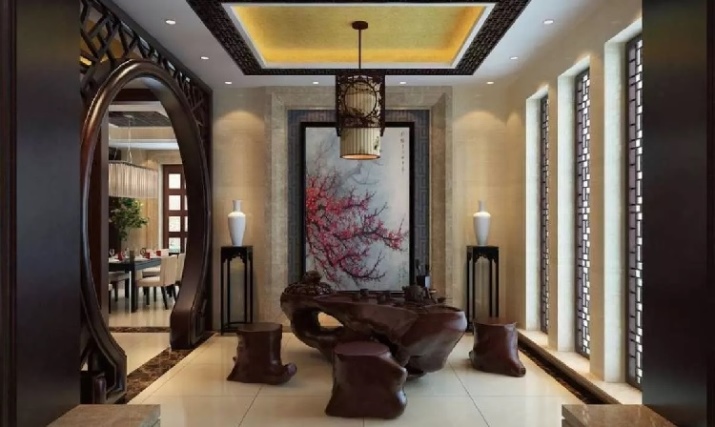
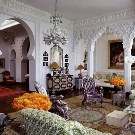
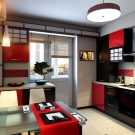
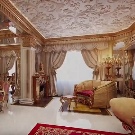
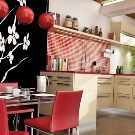

Varieties
Today, there are several varieties of oriental style in the interior of the premises, each of which has its own distinctive features, advantages and disadvantages.
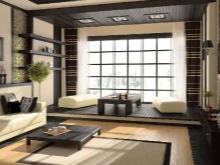
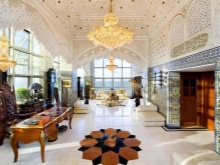
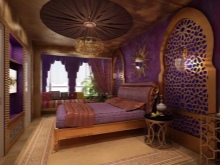
Arab
The Arabic style is very popular in the design of country houses and villas. Among the distinctive features of this direction are the following:
- softness of lines and the presence of domed shapes;
- a large number of details and textiles - soft carpets, curtains, large curtains are actively used as decorative elements; in addition, preference is given to textiles, which are handmade;
- when decorating, images of living creatures are not used;
- the decoration is luxurious and rich, as well as rich colors; the most popular are red, lilac and gold.
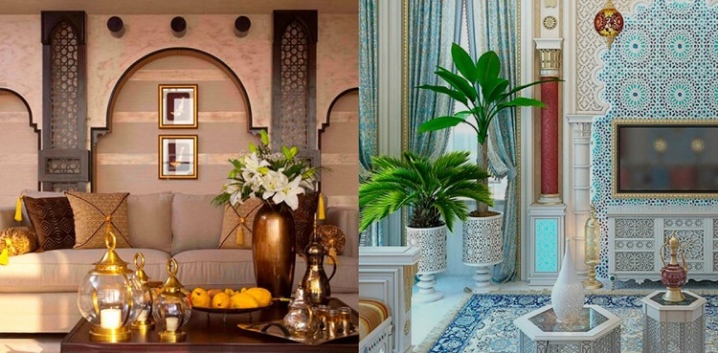
Wall painting looks quite interesting and stylish with the help of various ornate patterns and geometric shapes. The hallmark of the Arabic finish is that it is highly contrasting and characterized by bold colors. If it becomes necessary to create the feeling of a large amount of free space, then large arches can be used.
When decorating a Middle Eastern interior, you need to pay close attention to the ceilings, which should be high. It is thanks to this that there is always a lot of light in the rooms. Various pillows, ceramics, lamps, and so on are allowed as decorative elements.
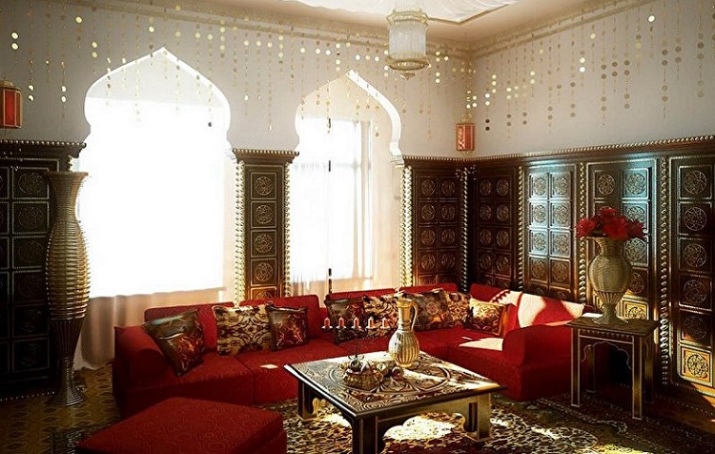
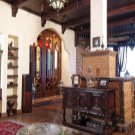
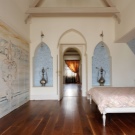
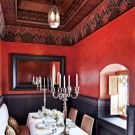
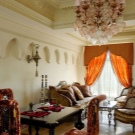
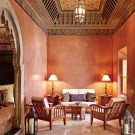
Chinese
The Chinese style has been wildly popular in recent years. Among the distinctive features of such an interior are the following:
- only natural materials are used in the finishing process; in addition, in the room you can see various ornaments on plant themes;
- all interior items must be arranged in such a way that everything is in accordance with the Qi teaching on energy and does not contradict the harmony of Yin and Yang;
- unlike the Arabic style, there should not be any pretentious forms, but everything is only simple and laconic;
- sharp corners in Chinese-style interiors are considered unacceptable.
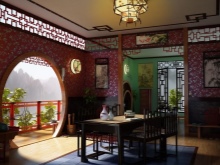
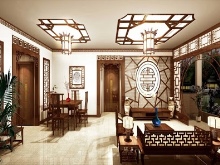
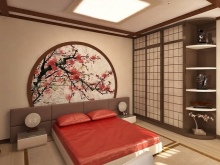
In the process of creating such an interior, close attention should be paid to the presence of free space. The Chinese believe that there should be as much of it in the room as possible so that the air has a place to roam. As furniture, wooden options are usually used, as well as various sliding panels. The main feature of the Celestial Empire is that they always give preference to multifunctional items.
The real highlight of the Chinese interior is the presence of landscape images, which are made in pastel colors. The panel looks great, which consists of many parts. An excellent solution would be to use a painting with various hieroglyphs.
If you want to create the most authentic decor, you can use items such as a fan, figurines or figurines.
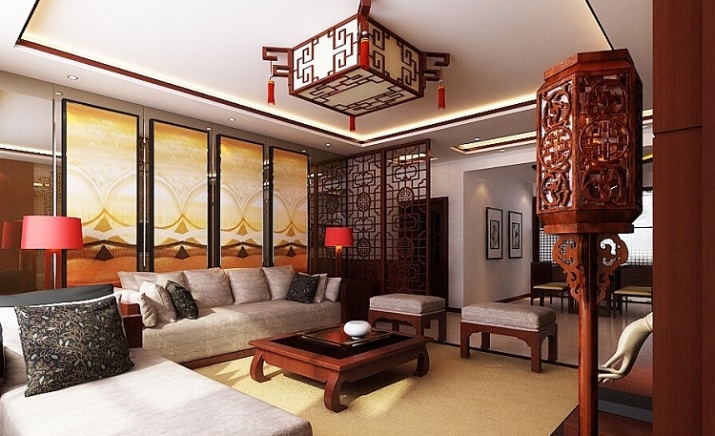

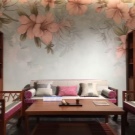
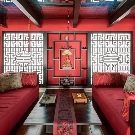
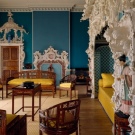
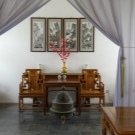
Moroccan
The Moroccan style is very popular today in European countries. A distinctive feature of the style is the originality of Morocco, the country's unique ethnic style and design. This style was created by mixing many others, so it is distinguished by its unpredictability and uniqueness. Among the main features of the Moroccan oriental style are the following:
- the presence of a large number of tires and arches in the interior is one of the distinctive features of the style, which sets it apart from others; in addition, the style is characterized by large windows and openings, as well as decorated niches;
- the use of low furniture, so that more items can be placed in the room without creating a cluttered effect;
- many oriental patterns with which you can decorate floors, floor coverings, furniture upholstery and much more;
- a bold combination of colors and textures, as well as unique and energetic combinations.
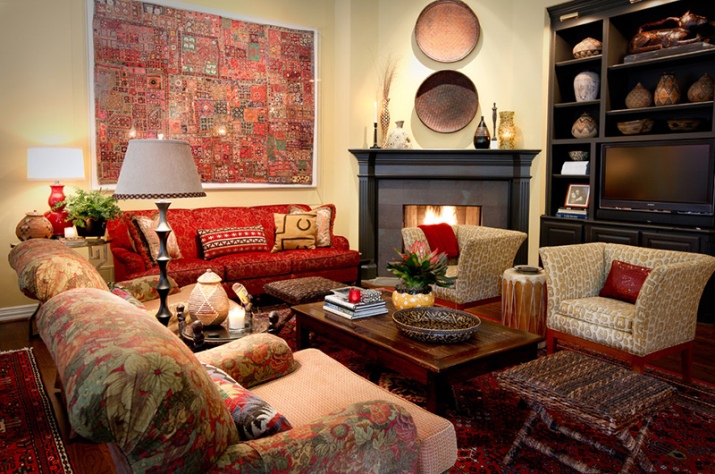
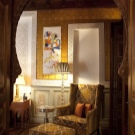
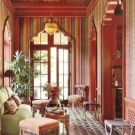
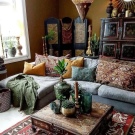
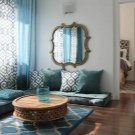
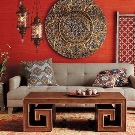
The most popular color scheme in this direction is a combination of red and gold. A large number of textile décor items are also considered normal in Morocco. That is why in such rooms you can always see a lot of pillows, bedspreads, bright curtains and so on.
This moment should definitely be thought over so that the interior does not seem too furnished, despite the many items.
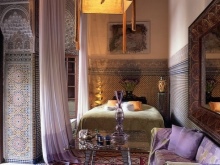
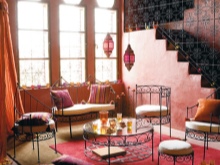
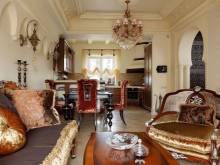
Japanese
The modern Japanese interior is built on spirituality, brevity and minimalism. It is precisely the strict adherence to these principles that will allow you to cope with filling empty space and creating an interesting and original interior.
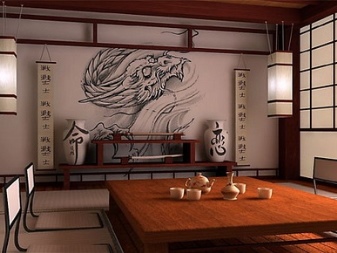
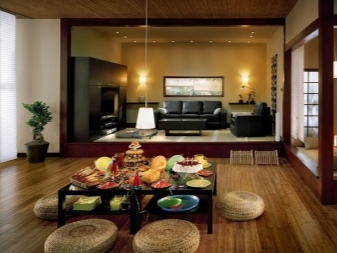
Among the distinctive features of the interior in this stylistic direction are the following:
- the use of natural motives and natural materials in the process of interior decoration;
- natural colors, which reminds of the need for human unity with nature;
- low furniture with even shapes, which allows you to fill the room with everything you need, but at the same time leave a sufficient amount of free space;
- the minimum number of decorative elements.

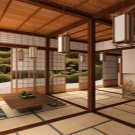
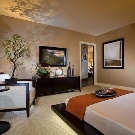
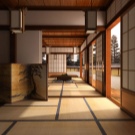
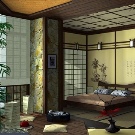
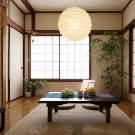
The most popular materials are bamboo, wood and natural stone. In addition, silk and paper can be used for decoration. But artificial materials in such an interior should not be.
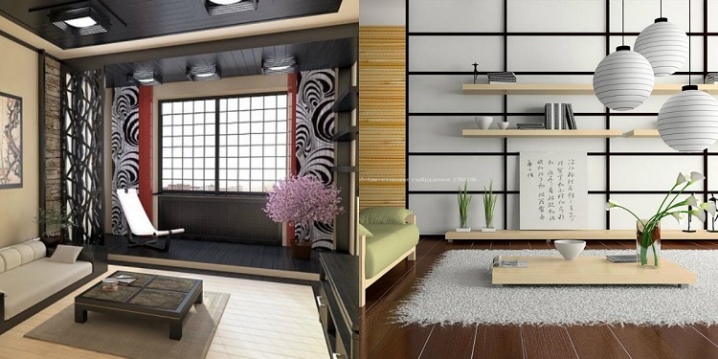
Indian
Indian culture has always managed to successfully combine simplicity and austerity of style with luxury. That is why the interiors here turn out to be very bright and original. In addition, such rooms are characterized by strict forms, as well as the absence of a lot of furniture. Every detail should be thought out in such a way as to emphasize the hospitality of the owner of the apartment or house.
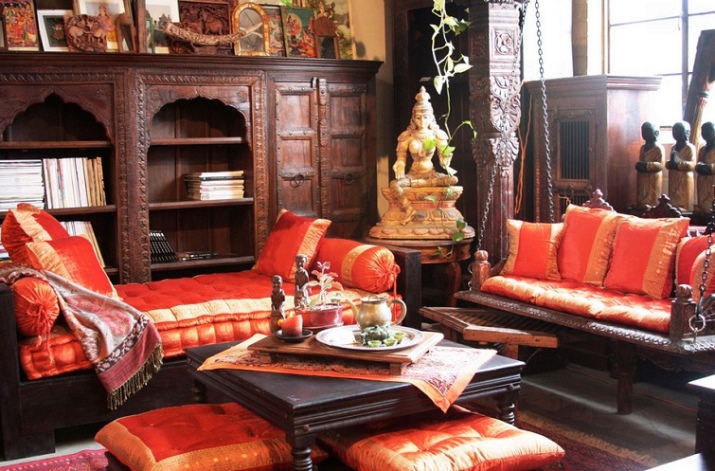
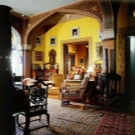
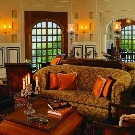
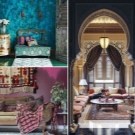
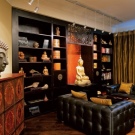
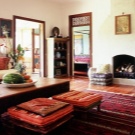
Color palette
It will not be difficult to decorate an oriental interior in the correct color scheme. You need to give preference to the natural palette and abandon neon tones. It is best to choose a few basic shades that will go well with each other. Among the most popular and optimal are red carmine, yellow, purple and burgundy.
It is necessary to pay attention not only to the colors of the walls and ceilings, but also to the textiles. It should also be not very bright and catchy, with the exception of the Arabic style, which involves the use of red and orange elements.
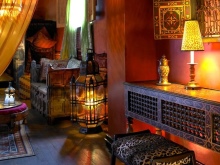
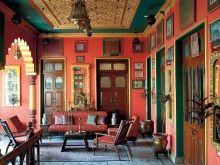
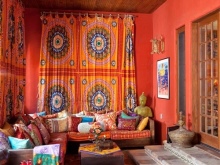
Choosing furniture and textiles
In the process of choosing furniture for an oriental interior, you need to proceed, first of all, from functionality. It is best to choose options that are made from natural wood. In the Arabic style, these are dark models, and in the Asian style, bamboo. As for the shape, there are no restrictions here, but there should be no sharp corners.
When creating an interior in an oriental style, you do not need to use a lot of furniture. A sofa, a large pillow, a table for food, a bedside table and other items if necessary will be enough. Furniture should be distinguished by simplicity and light shades, therefore, very often in such interiors you can see monophonic wardrobes.
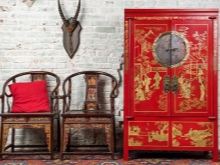
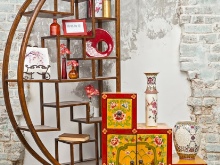
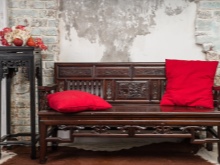
As for textiles, it all depends on the direction. A wide variety of carpets, curtains, capes and more can be seen in Arabic design. A distinctive feature of the East is that artificial things cannot be used here, so all fabrics must be natural.
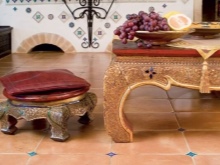
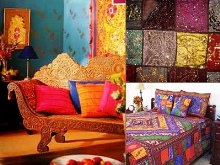
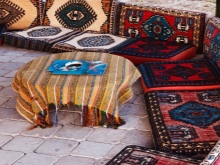
The fabric can be used not only to cover furniture, but also to decorate walls. On the windows, you can often see large velvet curtains with golden hues.
When decorating the interior in Arabic style, close attention is also paid to carpets. They can decorate not only the flooring, but also the wall. At the same time, it is extremely important that the product is handmade, and the color scheme does not stand out from the overall design of the room. In large houses, such carpets are usually used to cover the stairs, but the floor itself in the rooms is made of natural stone, so the owners prefer not to hide its beauty in any way.
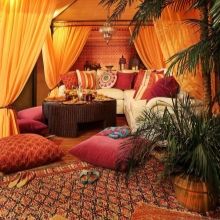
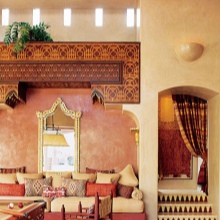
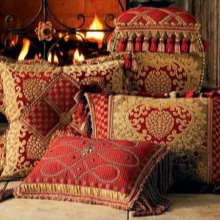
Wall, floor and ceiling decoration
In the process of decorating a room in an oriental style, you need to pay close attention to only two options: the use of bright and bed shades. Natural materials are considered the most preferable, among which bamboo, wood and various types of metals take pride of place. As for the walls, the relief is not necessary here, since they can be finished in any warm shades. Today, cream and beige are very popular and in demand.
Wood or natural stone can be used as flooring. The ceiling is usually done in a white color scheme, but you can also play with contrast and make the floor and walls in the same color.
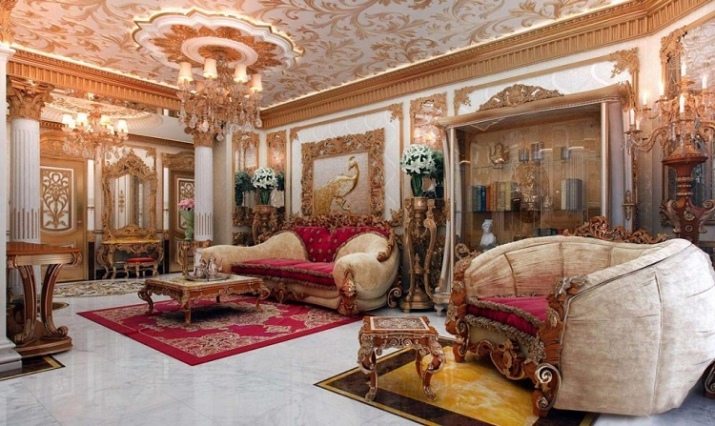
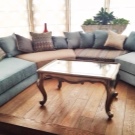
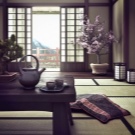
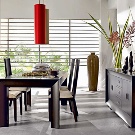
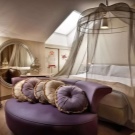
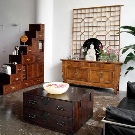
In the Arabian direction, you can make fabric stretch ceilings, which look quite interesting and impressive. It can also be suspended and include several levels using an original decorative strip with various imitations.
For wall decoration, it is allowed to use wallpaper or ordinary paint. It is best to give preference to the golden or silver color of the material. The ideal wallpaper when creating an interior in an oriental style is considered to be monochromatic, but the shade must be as warm as possible.
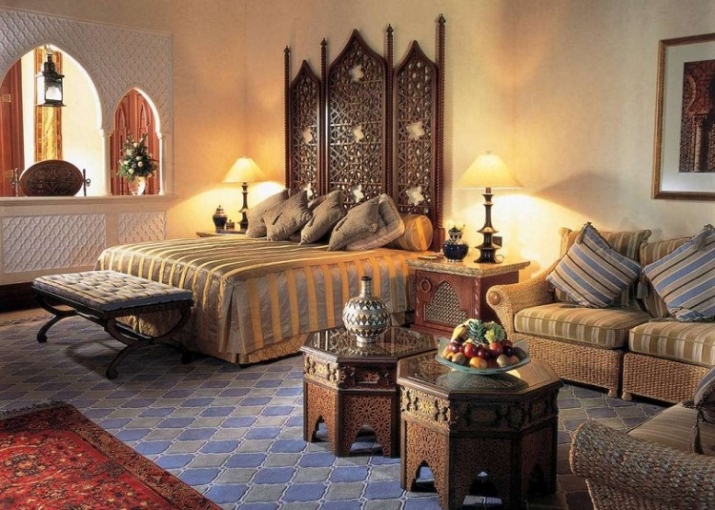
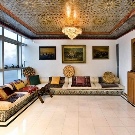
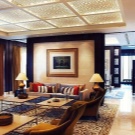
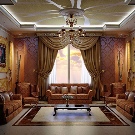
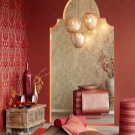
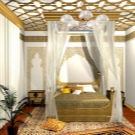
Decor options
The choice of certain adornments and decorative elements depends, first of all, on the ethnic variant. The Middle Eastern style is characterized by the following decor options:
- wood carving or stucco molding;
- patterned tiles;
- mosaic using bright colors;
- ceramics;
- painting.

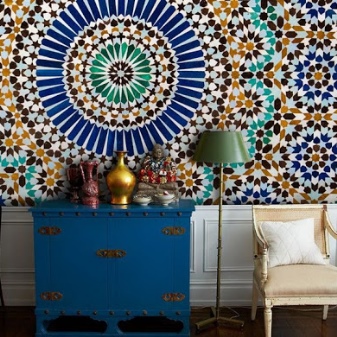
In the process of decorating walls, you can use several types of patterns at once. The carving for the mirror frame, which resembles arches and a ceiling, will be relevant. Ceramics will be a great decoration for tables, side tables and wall shelves.
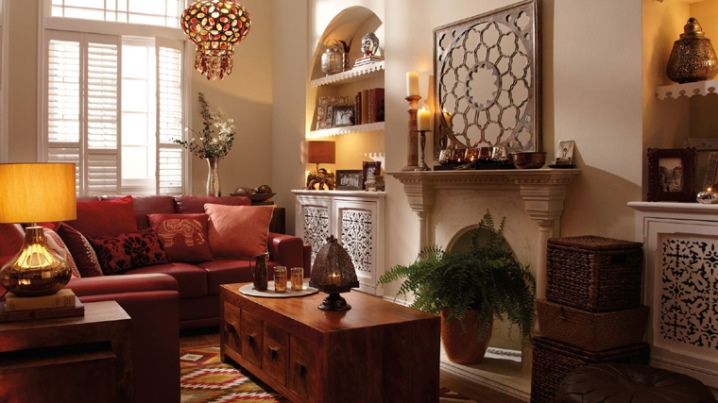
The Asian version involves the use of decorative elements such as:
- painting walls and panels using various symbols and hieroglyphs;
- artificial fans on the wall;
- various lanterns that hang from a chandelier or ceiling;
- aquariums, small fountains and other sources of water;
- porcelain vases and other similar items.
A great way to freshen up the interior is to use decorative bonsai trees, which are especially relevant for Japanese-style rooms.
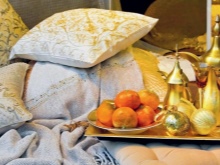
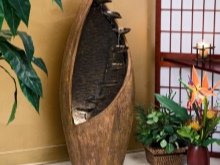
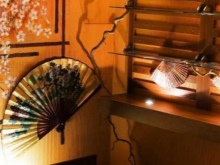
Lighting
A distinctive feature of the oriental style is that it requires good lighting. The more small light sources the better. Besides, they need to be placed in the correct order so that every corner of the house is as illuminated as possible. The use of LED lamps will have to be abandoned, since yellowish light is considered ideal for such interiors. And also the use of other warm shades will be quite appropriate, among which reddish, pink and lilac should be highlighted.
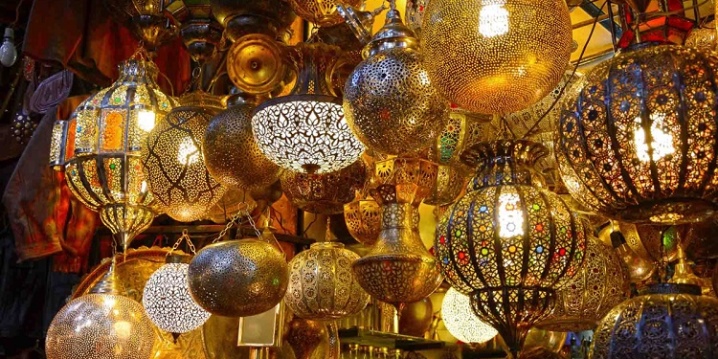
The Asian version involves the use of flat rectangular lamps that boast colored lampshades. Additional light sources can also be positioned on the wall and furniture, creating an interesting illusion of light.
As for the Arabic style, here you will need to use massive chandeliers and lamps. Interesting patterns on them allow the light to sparkle with interesting shades, as well as shimmer.
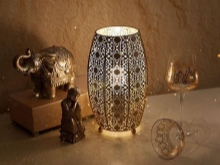
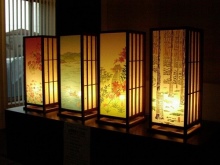
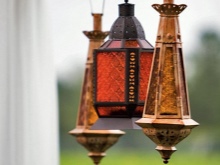
Interior design examples
- Japanese-style interior with retractable partitions that separate the living room from the veranda.
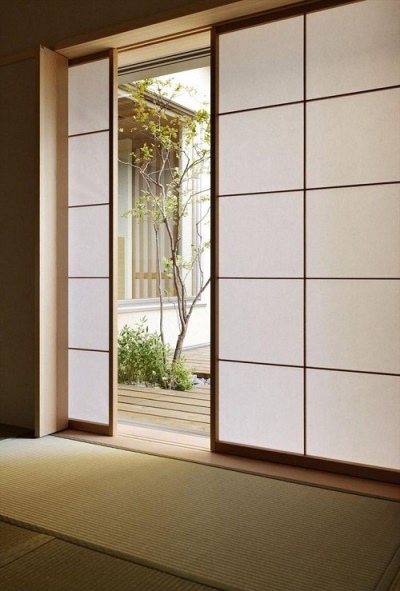
- Bedroom designed in Arabic style with many additional light sources and textiles.
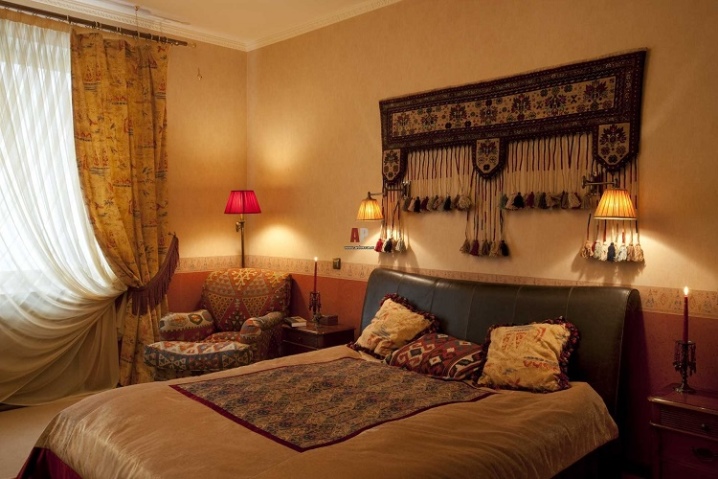
- Living room in oriental style with mosaic floor and wooden ceiling.
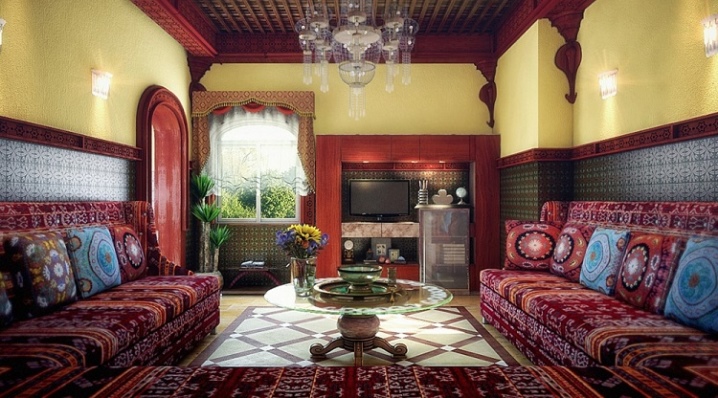
- Asian style kitchen with unique backsplash, sink and flooring.
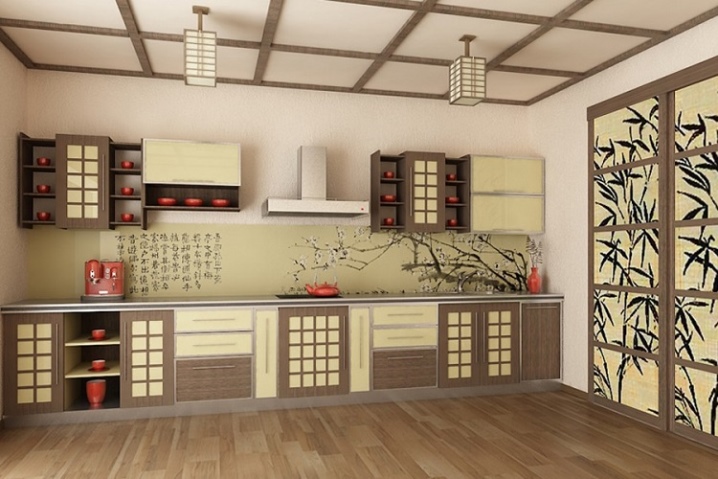
Thus, oriental style in the interior is considered one of the most popular and attractive. It involves changing every detail, from the doors to the attic. In this style, you can decorate a bathroom, nursery, living room and even a kitchen. To create an authentic interior, you need to use appropriate coffee tables, dressers, beds and light sources. In the resulting interior, you can enjoy relaxation after a hard day's work and gain strength.
In the next video, you can take a look at the design of the living room in an oriental style.













The comment was sent successfully.